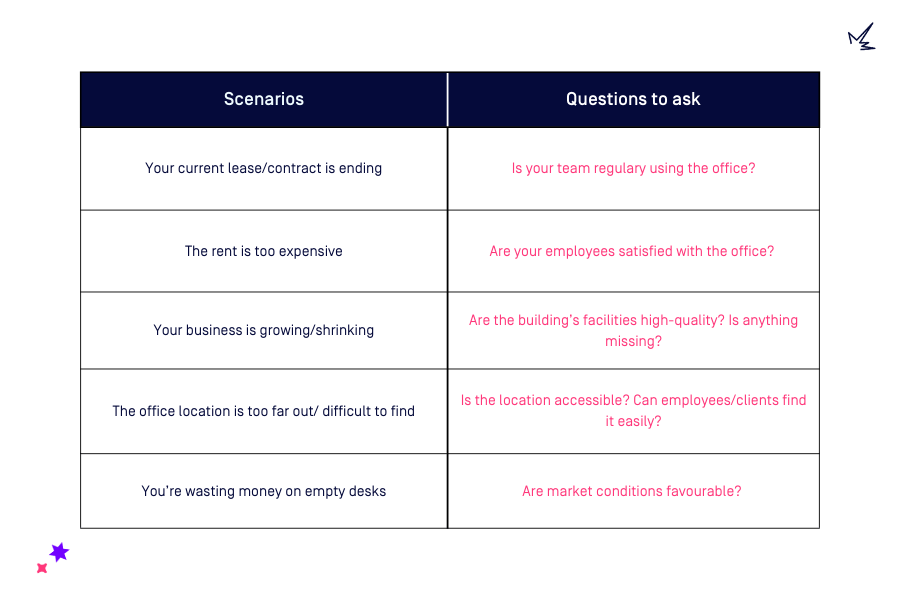If you’ve landed here, you’ve likely been chosen to manage a big office move, and you’re looking for an office space moving checklist.
We don’t blame you. Moving offices can be transformative for businesses, providing room to grow, create, and control your brand.
However, the process itself requires careful planning and can be daunting if you’re inexperienced.
But don’t worry. Like any process, an office move can be broken down into a series of simple tasks.
In this article, we’ll break down a list of things to check and consider when moving office. We’ve also created an ultimate guide to moving offices to help keep your move in check!

With it, you can learn how to compare office types, set your office relocation costs, and pick the perfect location. You’ll also gain expert tips on viewings and negotiations. Grab your copy here!
- How long does an office move take?
- How do you know when it’s time to move offices?
- Phase One: Planning for a successful office move
- Phase Two: Deciding how you’ll find your new office space
- Phase Three: Getting ready for move-in day
- Phase Four: Keep checking in and enjoy!
How long does an office move typically take?
To understand office move timelines, it’s essential to consider the key factors that determine how long it will take to plan, find, and move into an office. Here are the main ones to think about:
1) The type of office you move into
There are various office types you can choose from. But the one you pick determines whether your office move can take a weekend or six months.
For example, moving into a serviced office can take anywhere from 3 days to 2 months. For managed and leased offices, it’s slightly longer — anywhere from 1 to 12 months.
2) The size of your team
The size of your team will affect the duration in a few ways. Firstly, the larger the team, the more preferences to accommodate, and taking the time to understand this can be time-consuming.
Secondly, a larger team has more equipment. This means more boxes, more hands, and perhaps a need for larger moving vehicles. Decision-making can also be slower due to multiple stakeholders.
3) Your business needs and requirements
Every office move is different. While some businesses face more urgency, others have loads of time. For example, you may have complex requirements which demand more thorough research.
Or your business has expanded, so you need to quickly find a new office space that accommodates a larger team and growing business demands.
The office relocation process

How do you know when it’s time to move offices?
The first step in your office move journey is determining whether the timing is right. This shouldn’t be taken lightly — after all, it involves significant investment in both time and money.
Luckily, multiple factors hint towards an office move. At Hubble, we recommend exploring a few “Scenarios” or “Questions to Ask” to guide your decision-making. Here are a few examples:

Now we’ve covered the basics, here is your step-by-step checklist to planning an office move:
Step One: Planning a successful office move
Now that we’ve covered the main factors influencing how long it takes to move offices, let’s explore the four main considerations for making your office move smooth and successful.
1) Decide how you’re going to plan
Planning is your best friend, so make intelligent use of documents, spreadsheets and office move checklists.
Include all the tasks that need to be completed, no matter how small, as well as the steps leading up to them and the people, teams and companies responsible for each. This way, your tasks are compiled into more manageable bite-sized chunks.
Use your planning documents as your road map for the move, and use sharing software to let others collaborate and see what needs to be done.
2) Set criteria, like budgets and location
The most important criteria to nail down are the reasons why you want a new office, your budget, the location, ideal move date, and your team’s preferences.
Locations and budgets go hand in hand, as prices for full-time and part-time offices will vary depending on the postcode. You can start by checking current market averages for workspaces and using them to narrow down your options.
Our guide breaks down prices for both full-time and part-time offices and gives a detailed area breakdown to show you exactly how much office space costs in different areas.
This way, you can gauge a clearer idea of how much your office relocation will cost in London.

You can also use our office budget calculator to get an estimate of how much you should be spending on your office move!
3) Plan the timings carefully
Next, you’ll want to carefully plan the timing of your office move.
While you may not have much flexibility with the specific moving date, you can try to avoid moving at your business’s busiest time of year. Remember that your business still has to function during the moving process!
4) Set a deadline
Having a set deadline, or set of deadlines, in place will help you get everything done more efficiently.
With a deadline in sight you won’t have the luxury of procrastinating or putting things off until the next day. It’s motivating to have a deadline day for everyone to work towards.

Step Two: Deciding how you’ll find your new office space
There are multiple ways a company can search for and find an office space — and the method you choose will depend on your specific business needs.
While we’ve written an entire guide on this, here’s a brief recap for your convenience:
1) Traditional tenant reps
Traditional tenant representatives (tenant reps) are commercial real estate brokers who represent tenants looking for traditional office space, like leased offices.
From conducting market research to reviewing lease agreements, they focus entirely on the tenant’s needs, ensuring their best interests are prioritised.
However, landlords in this space typically specialise in long-term leases (5+ years). This means they’re unsuitable for companies with fluctuating headcounts or distributed teams and operations.
You’ll also have to pay a finder’s fee (around 10% of your first year’s rent), making it a more expensive choice.
2) Going direct
Next, we’ve got going directly to providers. This means contacting the workspace provider’s sales teams to find and negotiate office space, bypassing tenant reps or marketplaces like Hubble.
As you’re managing the entire process by going straight to a provider, you can be more in the detail of booking viewings, getting answers to questions, and negotiating on a deal.
You’ll also need to do all the legwork, research, and contact different providers. If you contact multiple spaces directly, you’ll deal with multiple salespeople, which can feel overwhelming.
3) Flexible workspace platform (like Hubble!)
Finally, we’ve got flexible workspace providers (like Hubble!)
These platforms offer an alternative to long-term leases with shorter-term solutions. Since they’re more flexible, companies can scale or downsize their office space as needed — without all the exit fees and disruptions.
For example, you may opt for a full-time or part-time serviced office, eliminating office management hassles like ongoing maintenance and utility bills. These spaces are also fully furnished and have all-inclusive facilities and amenities bundled into one monthly bill.
Companies can use a flexible workspace platform to search for office spaces, shortlist options, book viewings, and work with a Tenant Advisor who will help manage the entire process.

Step Three: Getting ready for office move-in day
So, by this point, you’ve secured your dream office. The contract’s been signed, the negotiations are over, and the countdown is on. Here’s how to prepare for the move itself:
1) Measure up and order furniture
If you’ve opted for a managed office or leased office, then you’ll need to prepare for the fit-out.
To do this, measure your space 4-6 weeks before the moving day. You’ll also need to determine what furniture you need to order.
Remember, if you’ve opted for a full-time or part-time office, these spaces are serviced. This means a separate company provides all the furniture and fit-out, so don’t worry about this!
2) Sort out security
It’s wise to contact your building manager at least one month before your move to check if your rental includes security.
If you need to find your own security company, call around for quotes and get them to survey the new office. Many security companies need a month’s notice, so get this done early!
Most of the flexible workspaces on Hubble already come with a security team, so this isn’t something you need to worry about. The workspace provider covers this all for you.
3) Inform your suppliers
If you usually have supplies delivered — such as fruit, water, milk or printing paper — get in touch with them at least three weeks before to let them know you’re moving. The same goes for your cleaning company!
If you’re moving into a full-time or part-time office, the workspace provider will already have these at the ready.
Whether it’s Knotel or Fora, most flexible workspace providers in London have fully-stocked communal kitchens and printers for all members. They also hire their own cleaning company who will ensure your office is always spick and span. Take a look yourself!

4) Double-check what’s included in your rent
While viewing your office, you should’ve already found out what essential facilities are included in your rent. However, there’s no harm in double-checking this before you make the big move.
Look into exactly what services are covered by your new office contract. If you’ve opted for a serviced office, most essential facilities — such as phone lines, WiFi, insurance, cables and utilities— are included in the rent.
If you’ve opted for a traditional and long-term rental, like a leased office, you’ll need to sort all of this out yourself. Talk to your current suppliers for their support during the move.
5) Create an office move to-do list / inventory
Lists are your best friend during an office move. It’s worth creating an inventory of everything you want to take in the move to keep everything in order. And make an office move list of everything you need to buy!
6) Hire a removal company
Next, you’ll want to find your perfect removal firm. This means getting quotes, checking out reviews, and asking friends and colleagues for recommendations.
Also, will you be packing yourselves? Do you need packing boxes, too? If so, you’ll need to get this sorted ahead of time.

7) Change your company address and phone number
Prepare “change of address” notifications to send to contacts and suppliers. Set up mail redirection and forwarding numbers if you cannot retain your current phone number.
8) Engage your stakeholders
In some cases, involving your team is the law. The Information & Consultation of Employees Regulations 2004 state that any changes directly affecting staff should be discussed with them.
Unions should also be engaged as soon as possible. Check that you’ve engaged with everyone you need to, which could include unions, regulators, parent companies, board members, department heads, and staff.
9) Communicate with your team
Before securing your new office, you should have informed your team about the big move. Ideally, you would’ve sent them a survey to discover their preferences and predicted usage, so they would already know about the office move.
However, you’ll also want to update them as the move progresses. They’ll always appreciate being consulted and updated regularly.
For example, individuals may have concerns that need addressing—whether that’s changes to their commute, parking availability, where they’ll be located, etc. Keep the door open!
10) Involve your team members
People who feel involved and engaged will get behind a move much more than if neglected or excluded.
A great way to get people together is to have each department present a representative for them on an internal office move team. This team can meet regularly and inform you of any concerns brewing within particular departments. Let them know how helpful their valuable input is to you.
Step Four: Keep checking in and enjoy your new office!

So, once you’ve finally moved in, there’s only one thing left to do: enjoy your new office space!
In that enjoyment comes checking in with your team to how they feel once they’ve settled in. It’s a good idea to regularly ask for feedback to help maintain morale and tackle any issues that may have cropped up.
Remember, if you’ve found your office through a flexible workspace provider, you’ll always have a team office relocation specialists to rely on for ongoing support. Whether it’s a query or advice, the support doesn’t end once you hold the keys!